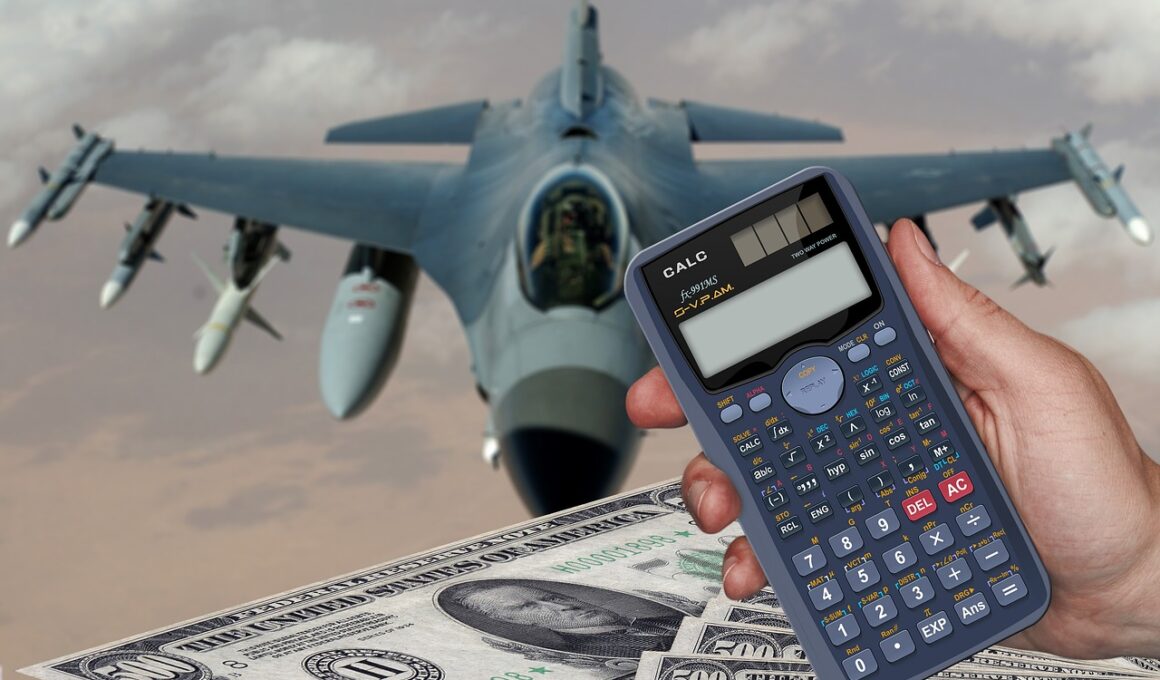The Role of Defense Spending in Fiscal Deficits and Surpluses
Fiscal policy plays a critical role in shaping a nation’s economic landscape, particularly concerning defense spending. Governments allocate substantial resources to military budgets for various reasons, including national security, strategic interests, and economic stability. When states increase military expenditures, this can lead to significant fiscal deficits if not balanced with other budgetary allocations. The implications are profound; nations have to make trade-offs between defense spending and other essential services such as education, healthcare, and infrastructure. Understanding the relationship between defense funding and fiscal health is vital for policymakers. Increased defense spending can potentially lead to economic stimulation, creating jobs and fostering growth in sectors associated with military production. However, it also raises concerns about fiscal sustainability. Politicians often face pressure to maintain or increase defense budgets even during times of economic uncertainty. On the flip side, severe budget cuts can jeopardize national security and military readiness. Ultimately, the balancing act between defense expenditures and overall fiscal responsibility shapes not only immediate economic outcomes but also long-term national interests.
Acknowledging the historical context of defense spending sheds light on its current implications. Since World War II, the United States and many allied nations have consistently increased their military budgets in response to global conflicts and rising threats. This trend is evident in various regions, with countries adjusting their expenditures based on perceived threats. For instance, during the Cold War, defense spending saw significant surges due to tensions between superpowers. Similarly, contemporary geopolitical shifts like the resurgence of Russia as a military power necessitate re-evaluating spending priorities. Many countries opt to finance advanced technologies in military capabilities, enhancing their defensive postures amidst complex global dynamics. Domestic factors, including economic recessions, also compel governments to prioritize military expenditure differently. For nations facing external pressures or instabilities, budget allocations towards defense often take precedence over social programs. However, the expansion of defense budgets frequently provokes public debate regarding the appropriateness of spending levels. Critics argue that excessive privileges for military funding can infringe upon critical social services. Nevertheless, government officials often justify such expenditures on the basis of potential threats, revealing the delicate balance of priorities in fiscal policy.
The Economic Impact of Defense Spending
The economic implications of defense spending encompass a broad set of factors beyond simple budgetary concerns; they affect overall national productivity and employment. Defense spending can stimulate various sectors of the economy, particularly in regions where military production is prevalent. Jobs in defense-related industries can provide substantial income resources, contributing to local and national economy vitality. Investments in technology and innovation resulting from defense contracts often have spillover effects in civilian sectors. Furthermore, military research breakthroughs have historically transitioned into commercial technologies benefiting the broader economy. However, focusing on military spending can redirect essential resources from other critical areas such as healthcare and education, potentially stunting longer-term economic development. The challenge lies in finding the right equilibrium between military preparedness and necessary social investments that foster sustainable growth. Policymakers face scrutiny when determining appropriate defense funding levels as they must consider trade-offs among various obligations. Balancing these competing priorities is essential for ensuring economic resilience, yet often proves a contentious topic within public debates. Thus, analyzing the economic impact of defense spending requires a nuanced understanding of these interconnected challenges.
International relations significantly influence national fiscal decisions and defense spending allocation. Countries frequently adjust their military budgets based on international dynamics, including alliances, treaties, and conflicts. For instance, NATO member states are encouraged to meet specific defense spending targets to ensure collective security among allies. However, some nations face criticisms for failing to commit sufficient funds, prompting discussions about burden-sharing among military coalitions. Rising global tensions have resulted in an increased focus on military readiness, compelling states to allocate more resources to defense budgets. Additionally, regional arms races can compel neighboring countries to ramp up their military financing, resulting in escalated fiscal pressures. Economic sanctions, trade relations, or geopolitical rivalries also complicate decisions surrounding defense funding. Engagement in peacekeeping missions or international coalitions may also necessitate increases in military expenditure. Ultimately, the increasingly interconnected nature of global politics significantly impacts how states budget for defense provisions. As nations navigate this complex landscape, they must balance their fiscal policies with necessary military commitments to maintain both national and international stability while managing fiscal responsibilities effectively.
Evaluating Public Sentiment on Defense Spending
The role of public sentiment in shaping defense spending policies cannot be understated, as citizens often express concerns about military expenditures. Polling data frequently reveals that constituents have mixed feelings about how far governments should go in funding defense versus social programs. During times of war or national security crises, public support for increased defense spending generally surges. However, as peace persists, priorities often shift toward pressing societal issues, such as education or healthcare. Various interest groups and organizations actively promote their agendas related to government budgeting, influencing public perceptions regarding defense funding. Campaigns advocating for social programs argue that excessive spending on military might undermine investment in critical social services. Conversely, military advocates contend that robust funding is essential to maintaining a secure and stable nation. Ultimately, democratic engagement surrounding these issues influences budgetary decisions as elected officials must respond to their constituents’ priorities. Promoting informed discussions about defense spending impacts not only policymaking but also the perceptions of fiscal responsibility among the populace. Public discourse plays an essential role in advocating for balanced funding that meets both security and societal needs.
As military technologies continue to evolve, the implications of defense spending extend not only to budgetary matters but also to ethical considerations. Governments face the responsibility to ensure that their defense expenditures promote security while being mindful of ethical implications. The development of advanced weaponry, drones, and cybersecurity measures raises questions regarding accountability and operational transparency. As debates rage over the appropriateness of certain military technologies, concerns arise about the implications these expenditures may have on global stability. Nations must consider not only the immediate benefits of increased defense budgets but also the long-term consequences of their military investments. Ethical considerations play a significant role in public perception, particularly regarding issues such as civilian harm or collateral damage resulting from military operations. As governments continue to refine their defense strategies, incorporating ethical frameworks becomes vital in guiding spending decisions. Balancing military effectiveness while adhering to ethical principles remains essential for sustaining public trust and securing ongoing financial support for defense initiatives. Ultimately, the alignment of defense spending with ethical considerations is crucial for its legitimacy and effectiveness within broader fiscal policies.
Conclusion: Balancing Defense Spending and Fiscal Responsibility
A nuanced approach to defense spending is essential for achieving fiscal responsibility while meeting national security needs. Policymakers must navigate the delicate interplay between defense financial commitments and other critical investments. Crafting budgetary plans that account for both immediate security threats and long-term societal benefits is complex yet essential. This careful balancing act requires transparent public discourse and accountability mechanisms to ensure military funds are spent directly in alignment with national interests. Ongoing evaluations of defense expenditures should consider their impact on overall fiscal well-being, ensuring that allocations do not diminish essential services. In conclusion, defense spending plays a significant role in shaping fiscal policy, with both immediate and long-term implications. Policymakers are called to act with diligence and responsibility to foster national security while ensuring fiscal stability. By engaging the public in discussions surrounding defense budgets, states can better allocate resources, balancing defense obligations with the needs of society. Ensuring a comprehensive understanding of these dynamics will be vital as nations work to align their military spending with broader economic objectives.


